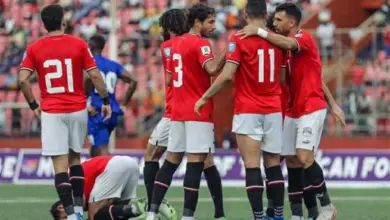Dominating the news today are protests by lawyers, escalating tension between police and Bedouin in Sinai, charges made against Alexandrian Khaled Saeed’s alleged torturers, and President Hosni Mubarak’s much-hyped one-day visit to Algeria.
On the “Judges vs lawyers” crisis, Al-Ahram writes that the Tanta Misdemeanors Appeal Court decided for a second time to postpone, until 8 July, two appeals in what is now known as the “Tanta lawyers case.”
The appeals are for two lawyers who received five-year prison sentences on 9 June after being convicted of attacking Tanta’s district attroney. Outside the courtroom, during the last session, there was a heavy presence of riot police, while, according to Al-Ahram, lawyers rowdily demonstrated.
The paper reports that inside the courtroom, arguments and even physical fights between lawyers and court guards ensued after the judges allegedly drove out most of the defense lawyers. Many volunteered to defend their colleagues, now behind bars, but some were barred entry to the court. Journalists were also held at the door and the courtroom itself was cordoned off.
In court, Lawyers Syndicate head Hamdi Khalifa was not in attendance. Khalifa had earlier refused to issue a formal written apology on behalf of the syndicate for the assault, according to Al-Ahram.
Al-Dostour provides more details from those lawyers present, who said the court listened to three witnesses called by the prosecution, whose testimonies, however, “were to the benefit of the lawyers.” According to reports, the court was originally scheduled to listen to testimonies from 14 witnesses but at Sunday’s session the presiding judges decided that three were enough and “more witnesses will not add anything new,” lawyer Mohamed Galal Shalaby told Al-Dostour. Shalaby also told the paper that three defense lawyers were seriously injured during clashes with guards.
Reporting on the same case, Al-Wafd newspaper in its early edition today writes of a rift between defense lawyers for the case. The paper doesn’t elaborate and details of inner disputes between the lawyers seem to be shrouded in mystery. Al-Wafd also reports that the judges in the dispute are refusing to change their stance, with Judge Zahran quoted in the paper as saying they “will not accept any apology.”
In other headline news, tensions between Sinai tribesmen and security officials are high despite mediation efforts following recent armed clashes between police and Bedouin. Bedouin were recently held responsible for an attack on a natural gas pipeline in the Sinai. Bedouin tribe leaders decried the arrest of their members and are currently trying to pressure the Egyptian government for their release through continuing protests in the Sinai peninsula.
Al-Wafd reports that following a 24-hour-truce disputes were reawakened after local police released just five of those detained. Tribesmen had demanded they release at least 30. Al-Wafd writes that, in protest, the Bedouins refused to meet with parliamentary representatives who had driven to Sinai to assist in reconciliation efforts.
Al-Shorouq meanwhile reports that security and check-points have been dramatically beefed-up in the peninsula, and Bedouin slums near the Suez road removed to prevent potential ambushes on police or convoys.
In other front-page news, a visit by Egyptian President Hosni Mubarak to offer his consolations to Algerian counterpart Abdel-Aziz Boutaflika for the death of his brother, has been hailed as a positive step by Egypt’s ambassador to Algeria, according to state-owned Al-Ahram and independent newspaper Al-Shorouq.
Ambassador Abdel-Aziz Seif el-Nasr told Al-Shorouq that the one-day visit gives a “push to the relations between the two countries.” The relationship between Egypt and Algeria turned sour after two football matches during the African Nations Cup games following which fans from each side attacked each other. Players in the two teams were also assaulted and pelted with stones in separate incidents, leading to a diplomatic row between the two nations.
Finally, independent and privately-owned newspapers run with the news that the two policemen held by the public as responsible for the brutal killing of Alexandrian 28-year-old Khaled Saeed will be put on trial. Al-Shorouq writes that Egypt’s public prosecutor has charged the policemen with torture and illegal detention. Saeed was seen by passersby while being beaten to death in front of an internet cafe in Alexandria in an incident that has been heavily condemned by human rights groups and caused members of the public to take to the streets in protest.
Initially the Interior Ministry claimed the beatings did not cause Saeed’s death but that he resisted a police search and choked on a packet of drugs in an attempt to hide evidence. Two autopsies confirmed this version of events, but lawyers for Saeed and human rights activists have questioned the veracity of the reports.




